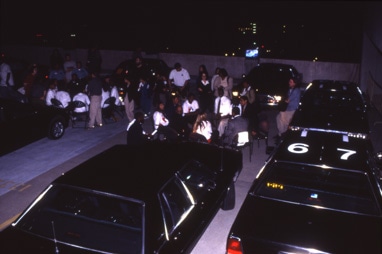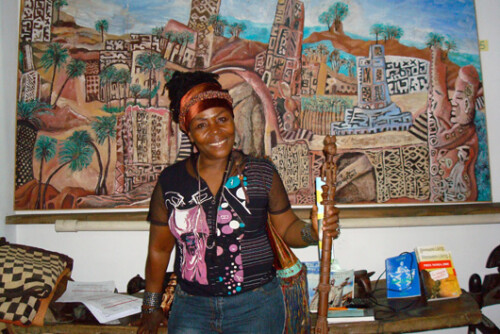The Impact of Personal Violence
Along with systematic oppression, low self-esteem is one of the most significant themes running through Miss Major’s analysis of transgender people’s relationship to poverty and incarceration. When people are rejected by their families, physically and sexually abused, and denied jobs and education because of who they are, it is not surprising that their survival skills could be impaired.
To me, Miss Major has always exuded strength and confidence, so it was especially poignant when she described some of the most vulnerable moments of her life: those defined by violence. She has been on the receiving end of violence at the hands of the state, her family, intimate partners, and strangers. Her family hit her for being transgender. During the Stonewall riots, a police officer knocked her unconscious with a blow to the head. A corrections officer broke her jaw when she was in prison. Intimate partners have beaten her. Whether violence takes physical, sexual, or emotional forms, it imposes additional burdens on a survivor that make life harder. Miss Major explained:
I’ve had my ass kicked by strangers. I’ve also been chased but not caught. You learn how to run in heels. But even if they don’t catch you, the fear is with you. It doesn’t leave. I’ve been waiting for a bus and had guys drive by and throw beer bottles at me. And I’ve felt the shards of glass rain down on my skin.
It’s not always physical contact—there’s mental, spiritual, and emotional abuse, too. The physical abuse you can get over, but if you say something to me, I will think about that every time I look in the mirror or see someone who looks like you. It’s a cloud that follows you, and let me tell you, it rains. 1
It is impossible to say with certainty what percentage of transgender people are survivors of physical and sexual violence. The National Coalition of Anti-Violence Programs (NCAVP) tracks incidents of hate violence and domestic violence against lesbian, gay, bisexual, and transgender (LGBT) people. While NCAVP reports higher numbers of LGBT violence than what law enforcement reports, to be counted among their numbers an LGBT person must both be victimized and report it to NCAVP. Because of this limitation, NCAVP does not attempt to extrapolate figures representative of national averages. 2 On a more local level, Miss Major approximates that 80 percent of the transwomen she works with are survivors of physical and sexual violence, including rape. While her estimate is based on a restricted sample and not intended to be scientific, the overwhelming majority of survivors among the women Miss Major works with highlights the grave need for service delivery and public policy that explicitly seek to reduce transphobic violence.
Miss Major works with social service agencies to ensure they are transgender inclusive, an issue she realizes requires both push and pull. Her voice heavy and measured, she described the difficulty in ensuring access to services for low-income transgender people of color: “The issue is getting the women to go, because we are so used to the abuse following us. I have gotten a few girls to go but it’s a slow process. There’s no speed with any of this. If you’ve experienced these kinds of abuses forever, there’s no hope that it’s going to end tomorrow.” Needless to say, if the service provider is not responsive to the needs of the women who do go, it is that much harder to convince others to follow suit. Guy Vandenberg, an HIV clinical specialist, explained how Miss Major helped train him as an HIV outreach worker:
As a medical provider, there are aspects of being transgender that we don’t know about, that we weren’t taught about, like transgender people who buy their hormones on the street or share needles to inject or use an iffy surgeon to get a silicone injection. We, of course, have our reactions about that: I and the other staff would be confronted by that and have this gut reaction that you shouldn’t do that. I would consult with Miss Major and ask how I should react and ask, tell me about the context […]. We [medical providers] would feel like we needed to do something but not alienate this very vulnerable community that needs so much support and was not getting it. Major formed the bridge to that. She really educated us about what is okay and what is not okay. The other very important thing was for her to provide this bridge—to act as this ambassador in a way [so that] people would even transfer their trust [to us] somewhat, and they would get the medical attention they needed. 3
Drug and alcohol addiction, other issues that also benefit from support by service providers, are problems that plague some members of the transgender community. Miss Major explained, “They [offer] a sense of escape and fortification. The drugs lie to you, caress you, make you feel things that aren’t really happening. They’re like a lover you can’t afford.” She recognizes that most people can’t tackle addiction without support, so she tries to connect people who want help with recovery programs. To her, a harm-reduction model makes the most sense. She explained, “I’m not there to make decisions for them or judge them. We don’t insist on your coming in clean or sober because that’s not the reality of the people we work with.” Here, Miss Major’s goals are modest: provide support and minimize health risks. Billie Cooper, who had a decades-long addiction, explained why she and other transgender women with addictions turn to Miss Major for support: “We find in her someone who is caring. She understands that sometimes we won’t take the advice. She doesn’t tell anyone what to do. She let’s us know it’s up to us to take what we need and figure it out.” 4 Because Miss Major is realistic, understanding, and supportive rather than instructive, I believe that the individuals she works with are more likely to be able to effect change for themselves than if they interact with service providers who don’t have these qualities. Yet, not all treatment programs are transgender inclusive, creating a similar trust issue as in services for people who are HIV-positive and people who are survivors of violence.
Transgender Exclusion in LGBT Activism: Weakening a Strong Queer Movement
Unfortunately, it is not just health, legal, and harm-reduction services that all too often fail to be transgender inclusive. When we began discussing LGBT movement politics for this article, I heard anger from Miss Major that hadn’t been there before. I believe that it comes from profound disappointment. As I interviewed Miss Major and her colleagues, I was at times overwhelmed by the distance between the queer realities they described and the priorities that dominate the US LGBT movement agenda.
Miss Major paints a vivid picture of how she perceives the LGBT movement’s exclusion of herself and others, especially transgender people who are low-income, people of color, or have criminal records. She said, “I feel like we’ve been pushed to the outside and then prevented from looking in. It’s the stares, the noninclusion over decision-making, exclusion from events that would build this movement. I think if they could eradicate us, they would.” As a result, she now works primarily with other transgender men and women and only infrequently with lesbians and gays. She is deeply hurt by the exclusion, however, because she remembers fighting alongside multiracial transgender friends at the 1969 Stonewall riots that are credited with birthing the American LGBT movement. “Transgender people were the first to fight. Yet, [non-transgender] men and white people took over and fucked whoever was there before. It was an inclusive club until we stood up for ourselves, and then it became gay white men running stuff.”
This sense of exclusion is in direct contrast with how she believes power must be distributed, and, indeed, how she believes a movement should be built. Until low-income transgender people and transgender people of color are in positions of leadership, she doesn’t think the LGBT movement will understand or prioritize their needs, and, therefore, the movement will not be sustainable. Certainly, to be relevant into the future, a movement must speak to the needs of the people it seeks to represent—or else they will go elsewhere. I asked her what she thought of the politics of gay marriage, and she replied:
I worked with the Mattachine Society in Chicago in the 1960s. They wanted guys to wear suits and lesbians to look like moms with apple pies, so this marriage stuff is not new to me. But why try to assimilate into someone who hates your fucking guts? I do think these issues are important. These are people’s rights and if one set of people can do this, why not another set? However, do I think these are major causes to jump behind? No. 5
And so there is a significant philosophical difference between existing LGBT movement priorities and what community activists like Miss Major prioritize. Mainstream movement priorities focus on removing the queer stigma from otherwise secure middle-class lives, which is why overt policy-based discrimination like marriage and hate crimes is the focus. Yet, the approach of Miss Major and other community activists like her is to say: How is discrimination on the basis of gender identity and sexual orientation embedded in life’s hardships? How is it related to racism, classism, and sexism? Fighting for domestic partner benefits is important, but it means little to someone who can’t find a job. This argument not only means taking into account a broader range of issues that affect people’s lives than just sexuality or partnership status, but stands to infinitely strengthen the movement by prioritizing points of commonality with other struggles for justice and human rights. Bridge building helps us all. Andrea Bible, formerly of the National Clearinghouse for the Defense of Battered Women, who has spent much of her career working with incarcerated women, commented, “I deeply appreciate that [Miss Major] has connected to the organizing efforts of people in women’s prisons, even though that isn’t the focus of her work. […] That approach serves the struggle in so many important ways.” 6
- Miss Major, personal interview, July 11-13, 2009, via phone. Transcripts on file with author.[↑]
- National Coalition of Anti-Violence Projects, Hate Violence Against Lesbian, Gay, Bisexual, Transgender, Queer and HIV-Affected Communities Violence in the United States in 2010 (PDF) (New York: National Coalition of Anti-Violence Projects, 2011). (Accessed January 9, 2012).[↑]
- Guy Vandenberg, personal interview, July 14, 2009, via phone. Transcript on file with author.[↑]
- Miss Major, personal interview, July 11-13, 2009, via phone. Transcripts on file with author.[↑]
- Miss Major, personal interview, July 11-13, 2009, via phone. Transcripts on file with author.[↑]
- Andrea Bible, personal interview, July 14, 2009, via phone. Transcript on record with author.[↑]



